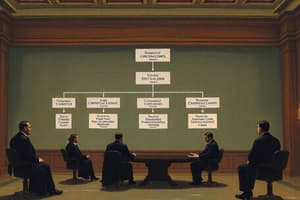Podcast
Questions and Answers
Which leadership style involves strict discipline and decision-making by the leader alone?
Which leadership style involves strict discipline and decision-making by the leader alone?
- Democratic style
- Situational style
- Authoritarian style (correct)
- Liberal style
What is the primary focus of active listening in communication techniques?
What is the primary focus of active listening in communication techniques?
- Recognizing non-verbal cues
- Asking questions to clarify details
- Understanding the words spoken
- Providing feedback to enhance clarity (correct)
In which motivation theory is the concept of 'hygiene' and 'motivators' introduced?
In which motivation theory is the concept of 'hygiene' and 'motivators' introduced?
- Maslow's hierarchy of needs
- Vroom's expectancy theory
- Herzberg's theory (correct)
- McClelland's theory of needs
Which of the following is NOT a stage of group development?
Which of the following is NOT a stage of group development?
What is the main aspect of the liberal leadership style?
What is the main aspect of the liberal leadership style?
Which communication technique focuses on understanding another person's feelings and perspectives?
Which communication technique focuses on understanding another person's feelings and perspectives?
What is usually the cause of conflicts within a group?
What is usually the cause of conflicts within a group?
Which need is at the top of Maslow's hierarchy of needs?
Which need is at the top of Maslow's hierarchy of needs?
What does the situation-based leadership style emphasize?
What does the situation-based leadership style emphasize?
Which theory relates employee performance to expected outcomes?
Which theory relates employee performance to expected outcomes?
Study Notes
Басқару психологиясы
1. Басқарушылық стильдер
-
Авторитарлы стиль:
- Басшы шешімдерді өз бетінше қабылдайды.
- Қатаң тәртіп және бақылау орнатылады.
-
Демократиялық стиль:
- Команда мүшелерінің пікірлері мен идеяларына құлақ асады.
- Шешімдер топпен талқыланып қабылданады.
-
Либералды стиль:
- Қызметкерлерге көп еркіндік беріледі.
- Дара жауапкершілік артады, бірақ басқару қиын болуы мүмкін.
-
Ситуациялық стиль:
- Жағдайға қарай басқару тәсілдерін таңдау.
- Команда мүшелерінің жағдайы мен қажеттіліктеріне байланысты өзгеру.
2. Коммуникация техникалары
-
Активті тыңдау:
- Сөздерді емес, эмоцияларды түсіну.
- Кері байланыс беру арқылы түсініктікті арттыру.
-
Негізгі тіл:
- Сөйлесудің құралдары: вербальды (сөз), невербальды (жест, мимика).
-
Көйлек-салон техникасы:
- Сұрақ қою арқылы мәселені анықтау.
- Талқылаудағы жағдаяттарды түсіну.
-
Эмпатия:
- Басқа адамның сезімдері мен көзқарастарына түсіну.
- Командалық қатынастарды жақсарту.
3. Мотивирлеу теориялары
-
Маслоу пирамидасы:
- Негізгі қажеттіліктерден (физиологиялық) бастап жоғары қажеттіліктерге (өзін-өзі жүзеге асыру) дейін.
-
Герцбергтің теориясы:
- "Гигиена" және "мотиваторлар" – жалақы, жұмыс шарттары (гигиена) және еңбек нәтижелері (мотиваторлар).
-
Мотивирлеу теорияларының әртүрлілігі:
- Врумның күтілген теориясы: қызметкерлердің еңбек нәтижесіне күтілетін нәтижелердің әсері.
- МакКлелландтың қажеттіліктер теориясы: жетістікке, билікке және байланысқа деген қажеттіліктер.
4. Топтық динамика
-
Топ құрылымы:
- Рөлдер (лидер, кеңесші, орындаушы) және олардың маңыздылығы.
-
Топ ішіндегі байланыстырушы күштер:
- Топтағы адамдардың бір-бірімен қарым-қатынасы.
-
Конфликттер мен шешу тәсілдері:
- Конфликт себептері: коммуникация, рөлдер, ресурстар.
- Шешу тәсілдері: компромисс, консенсус, бәсекелестік.
-
Топтық даму кезеңдері:
- Формирлеу, конфликт, нормалау, іс-әрекет, ажырату.
Leadership Styles
- Authoritarian: Leader makes all decisions independently; strict discipline and control are enforced.
- Democratic: Leader values team member input and ideas; decisions are made collaboratively.
- Laissez-faire: Employees have significant freedom; individual accountability increases, but management can be challenging.
- Situational: Leadership approach adapts to circumstances; changes based on team member needs and situations.
Communication Techniques
- Active Listening: Focuses on understanding emotions rather than just words; utilizes feedback to improve understanding.
- Basic Communication: Uses verbal (spoken words) and nonverbal (gestures, facial expressions) cues.
- Problem-Solving Technique: Uses questioning to identify issues; clarifies situations during discussions.
- Empathy: Understanding another person's feelings and perspectives; improves team relationships.
Motivation Theories
- Maslow's Hierarchy of Needs: Progresses from basic needs (physiological) to higher-level needs (self-actualization).
- Herzberg's Two-Factor Theory: Differentiates between "hygiene factors" (salary, working conditions) and "motivators" (achievement, recognition).
- Other Motivation Theories: Vroom's Expectancy Theory emphasizes expected outcomes of work; McClelland's Needs Theory focuses on needs for achievement, power, and affiliation.
Group Dynamics
- Team Structure: Roles (leader, advisor, executor) and their importance within a group.
- Team Cohesion: The strength of relationships between team members.
- Conflicts and Resolution: Conflict causes include communication breakdowns, role conflicts, and resource scarcity; resolution strategies include compromise, consensus, and competition.
- Team Development Stages: Forming, storming, norming, performing, adjourning.
Studying That Suits You
Use AI to generate personalized quizzes and flashcards to suit your learning preferences.
Description
Explore the various management styles like authoritarian, democratic, liberal, and situational, each with its unique approach. Additionally, this quiz covers effective communication techniques such as active listening and empathy. Test your knowledge on these essential concepts in management psychology.




